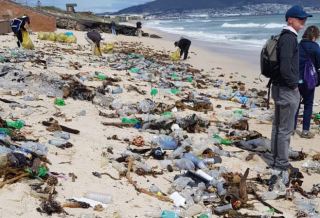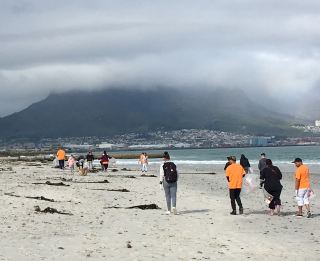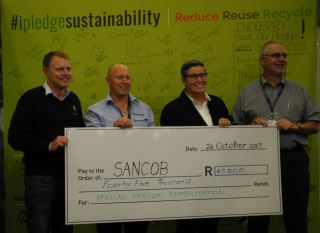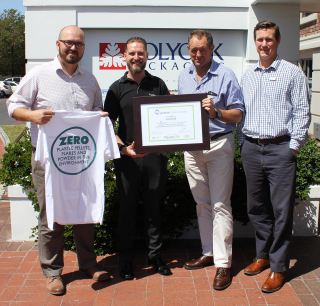Initiative to Capture Cape Town’s Trash Before it Hits the Coast
The City of Cape Town has joined key players and interested groups in the first of many meetings, to investigate ways to remove garbage from Cape Town’s rivers so it doesn’t make it into the ocean.
Included at the meeting were Plastics|SA, the South African Department of Environmental Affairs, Woolworths, The Percy Fitzpatrick Institute of African Ornithology, The Polyolefin Recycling Company (Polyco), Cape Town non-profit organisation Clean C, local digital marketing firm Gnu World Media and several other groups.
John Kieser, Sustainability Manager of Plastics|SA and facilitator at the meeting, says the main goal of this network will be to share information, ideas and resources for minimising the amount of litter that washes into the city’s seas.
Black River in Observatory is the first focus area. Already, Plastics|SA and the City of Cape Town’s Environmental Management Department have set up a system to remove litter floating on the river – 80 to 90% of which is plastic. A team gathers plastic at designated areas once or twice a week and takes it to Bokmakierie Primary School, where it’s separated and sent off for recycling.
In KwaZulu-Natal, the Department of Environmental Affairs is currently conducting similar projects, focusing on the Umgeni and three other rivers. If all goes to plan, the Department may consider funding similar Expanded Public Works Programme (EPWP) projects in Cape Town.
In the meantime, Kieser says the Cape Town network of groups will prevent people with the same vision – keeping our rivers and thus our oceans clean – from working in silos.
“It’s great that the plastics industry is facilitating this kind of dialogue,” says Gregory Player of NPO Clean C. With support from Cape Town-based digital marketing firm Gnu World, Clean C is working on a similar project – installing litter-catching nets over stormwater drains in the 4 kilometres between Sunset Beach and Milnerton Lagoon. Large amounts of household and general refuse – mostly plastic – washes into the lagoon from drains in areas including Joe Slovo, Sanddrift and Milnerton and then ends up on the beach and in the ocean.
The project would require a trained team of five to do regular clean-ups, and equipment like wheelie bins, uniforms, and a truck to transport the collected garbage.
Player says many EPWP projects run only in the short term and that most of the achieved improvements are lost once funding ends. “We’d like sponsorships to get the project off the ground – but once it’s implemented, we will move towards making it self-sustaining,” says Player.
Taryn Nightingale, PR and outreach specialist at Gnu World Media, says, “People forget that we form part of the same ecosystem the rivers, plants, oceans and animals do. We need to change how we view plastic and its value. When it’s recycled, there’s the opportunity to earn money from it, but when thrown away, it has grim consequences.
”Currently, only 5% of South Africans recycle. Mandy Naudé, CEO of Polyco, says the main reasons for this are a lack of education, incentive and infrastructure. “We must make it convenient for South Africans to recycle.” The organisation recently launched PACKA-CHING, which aims to increase recycling in informal settlements and lower-income areas. It has been running in Langa for about a year, and has resulted in the removal of about 240 000 kilograms of plastic since its inception.
Anyone interested in joining this network of plastic catchers or in helping in some way can contact John Kieser at This email address is being protected from spambots. You need JavaScript enabled to view it..
THOUSANDS OF SOUTH AFRICANS ROLL UP THEIR SLEEVES FOR WORLD CLEAN-UP DAY 2018
Thousands of South Africans rolled up their sleeves, put on their rubber gloves and took to the beaches on Saturday, 15 September 2018 as part of the first World Clean-up Day - the largest peacetime civic action in human history.
Stretching across 24 different time zones, involving 144 countries and more than 13 million volunteers worldwide, World Clean-up Day started in Fiji and moved around the globe with the time zones, ending in American Samoa 24 hours later. In South Africa, 26 thousand registered volunteers and many more unregistered citizens arrived at beaches between 09:00 and 12:00 to do their bit to pick up and remove litter from our marine environment.
South Africans unite for a clean environment
Plastics|SA and sponsors partnered with Let’s Do It! Africa and Ocean Conservancy by coordinating South Africa’s involvement in this year’s clean-up, and provided resources in the form of 300 000 specially printed yellow refuse bags, latex gloves and ground support to make this one of the biggest events ever to take place in South Africa as part of the annual Clean-up and Recycle SA Week.
According to John Kieser, Sustainability Manager at Plastics|SA and coordinator of the beach clean-ups that took place in KwaZulu Natal, Southern, Eastern and Northern Cape, the annual event has grown tremendously since the first time South Africa took part in the International Coastal Clean-up Day 22 years ago.
“The public awareness about the damage litter causes to the marine environment and a willingness to do something about it, has reached an all-time high. Regardless of their age, gender, race or economic position, South Africans realise that even the smallest effort makes a big difference in the end. Saturday saw one of the biggest turn-outs of volunteers we had ever seen as people from all walks of life put their differences aside and worked shoulder to shoulder for a great cause,” Kieser said, thanking all the volunteers and the various sponsors who participated and helped to make the event a huge success.
Keeping South Africa’s coastline clean
More than 110 official clean-up events took place around South Africa’s coastline that stretches for more than 2 500km along two oceans, although many more unregistered, community driven spontaneous events took place throughout the week and on the day.
Highlights of the 2018 event in South Africa include:
Hosting three of the largest off-shore island clean-ups that took place on Robben Island, Dassen Island and Bird Island.
Growing clean-ups on the Wild Coast from seven in 2017 to forty-two this year.
Initiating beach clean-ups in ecologically sensitive areas and areas with no area cleansing services
Contending with Mother Nature
Although it was slightly rainy in Cape Town, the volunteers were still very motivated to keep up their fantastic work and respond to the call to help create a waste-free world.
“Unfortunately some of our clean-ups had to be cancelled or postponed due to rough sea conditions, but it was nothing as severe as the three active tropical cyclones that affected 11 of the participating countries. According to global disaster alerts, the Philippines, Hong Kong, Taiwan, South Korea, Macau, several US States and the Dominican Republic were all significantly impacted due to the strength and paths of the storms, posing a threat to millions of people. Once conditions are safe again, with damage assessments complete, these countries and territories who had to postpone their events will resume their commitment to their clean-up plans, with hundreds of thousands of people likely to swell the numbers recorded,” Kieser says.
The biggest litter bugs
In order to get a detailed snapshot of the biggest pollutants on the country’s beaches, the Plastics|SA team will again be spending the next month analysing the data sheets that were filled in by volunteers at the audited clean-ups. Despite extensive education and awareness campaigns that have taken place in South Africa over the past few years, Kieser remarked that the volunteers were all shocked to see the amount of litter strewn on beaches and between rocks. The most prevalent items collected each year are earbud and sucker sticks, straws, sweet wrappers and cigarette butts.
Effective waste management to follow up civic action
“The purity of our oceans is a crucial issue for our country. However, it is important to remember that clean-ups do not offer a long-term solution and are not meant to replace regular waste management. With events such as this past weekend’s World Clean-up Day, the aim is to draw attention to littering, trash blindness and general mismanagement of waste. Civic action must be followed up by effective waste management reforms. Improved waste collection and management must be established everywhere. We also need to look at what we are throwing away, because nothing is waste until it’s wasted. Plastics and other packaging material should not end up in landfills and definitely not in our oceans, because they are valuable resources should be recycled,” Kieser concluded.
For more information, visit www.clean-upandrecycle.co.za or www.plasticsinfo.co.za
-- ENDS --
Notes to the editor:
Inputs were received from www.worldcleanupday.org.za
The exact number of volunteers who participated and clean-ups that took place in South Africa will be made available later this year when data sheets about this past weekend’s beach clean-up have been audited.
Packaging and Plastics Industries raise R45 000 for New Seabird Hospital
The South African plastics and packaging industries managed to raise an incredible R45 000 during last week’s Propak Cape Exhibition by inviting companies and individuals to pledge funds for a much needed seabird hospital at SANCCOB’s Cape Town centre.
According to Douw Steyn, Sustainability Director at Plastics|SA, leaders in the packaging industry and individuals did not hesitate to dig deep into their pockets for the #Ipledgesustainability campaign when they visited the Packaging SA / Sustainability pavilion where the fundraising took place.
“Our sincere thanks to Nampak, Pailpac, Polyoak Packaging, Extrupet, Tetrapak, Polyco, Bené Water, SANBWA, PETCO and Gundle Plastics for pledging towards the SANCCOB Saves Seabirds Project. We are very proud of the funds that we managed to raise in only three days,” Steyn said. By purchasing a R50 raffle ticket on the stand, individuals could win one of two picnic tables made from recycled plastic, courtesy of Tufflex Plastic Products.
Francois Louw, Fundraising and Marketing Manager for SANCCOB, confirmed that the funds raised will help them take a big step towards reaching their target of R5 million needed for the new facility.
“Our seabird centre in Table View has been in operation for 33 years and has served the needs of more than 95 000 seabirds. However, the elderly buildings and facilities are now in desperate need of renovation. We are deeply grateful for the generosity of the plastics and packaging industries this past week which will help us build a new and better seabird hospital”.
Apart from increasing SANCCOB’s capacity (they currently admit around 2000 seabird patients every year), the upgrade will also include a surgery, an Intensive Care Unit, a new X-ray room, laboratory, three new pools, an aviary, as well as several new pens and preparation areas when construction is completed at the end of 2017.
“Seabirds and penguins are often the first casualties when disasters such as oil- or pollution spills hit our coasts. Both Plastics|SA and Packaging SA have signed the Declaration of the Global Plastics Associations for Solutions on Marine Litter - a global declaration and public commitment made by the international plastics community to address the issue of plastics in the marine environment, which was launched in March 2011. Raising funds for the SANCCOB hospital fits in with our focus and mandate of Operation Clean Sweep in which we aim to find workable solutions for all aspects of marine pollution,” Steyn concluded
For more information, visit www.plasticsinfo.co.za or www.sanccob.co.za
Plastics|SA rolls out Operation Clean Sweep:
Polyoak Packaging has become part of a worldwide drive by plastics leaders to reduce the amount of plastic pellets ending up in rivers and ultimately in the ocean, by signing a pledge to prevent resin pellet, flake and powder loss as part of Plastics|SA’s Operation Clean Sweep.
Attending the signing ceremony that took place at Polyoak Packaging’s regional head office in Cape Town , were Jacques Lightfoot, Sustainability Manager at Plastics|SA, Stuart Allen (Operations Manager), Rowan le Roux (Sustainability Manager) and Jeremy Mackintosh, Group Managing Director at Polyoak Packaging.
Explaining the importance of making a public declaration to prevent pellet loss, Mackintosh said: “Polyoak is proud to be one of the country’s biggest manufacturers of plastic packaging. Because we use large quantities of plastic pellets and flakes on a daily basis to produce items such as plastic bottles, closures and containers, it is important that we adhere to strict environmental standards and take a leading role as a responsible producer. By signing the Operation Clean Sweep pledge, we want to highlight our commitment to making zero pellet loss a priority by ensuring that pellets are kept out of the natural environment, including waterways and oceans”.
Douw Steyn, PlasticsǀSA Sustainability Director explained that ingesting plastic items, such as pellets, could affect the ability of seabirds, turtles and fish to breathe, swallow or digest foods properly. “Whilst the public is responsible for proper recycling and disposal of consumer products and packaging, the responsibility to contain plastic pellets firmly rests on the shoulders of the plastic industry,” he said.
To this end, Plastics|SA has been promoting Operation Clean Sweep to the industry, developed resource materials for its members and is in the process of developing systems aimed at containing plastics since it launched the initiative on World Oceans Day (8 June) at the uShaka Marine World in Durban earlier this year.
“We are proud to be one of the first companies signing the pledge as we believe there is a direct link between sustainability and profitability. Adhering to green practices such as Operation Clean Sweep is not only environmentally sound, but also makes good business sense,” Mackintosh concluded.
Note to the Editor:
For more information, visit www.plasticsinfo.co.za/opcleansweep or www.polyoakpackaging.co.za
Plastics|SA is a signatory of the Declaration of the Global Plastics Associations for Solutions on Marine Litter, a global declaration and public commitment made by the international plastics community to address the issue of plastics in the marine environment, which includes Operation Clean Sweep, which was launched in March 2011





